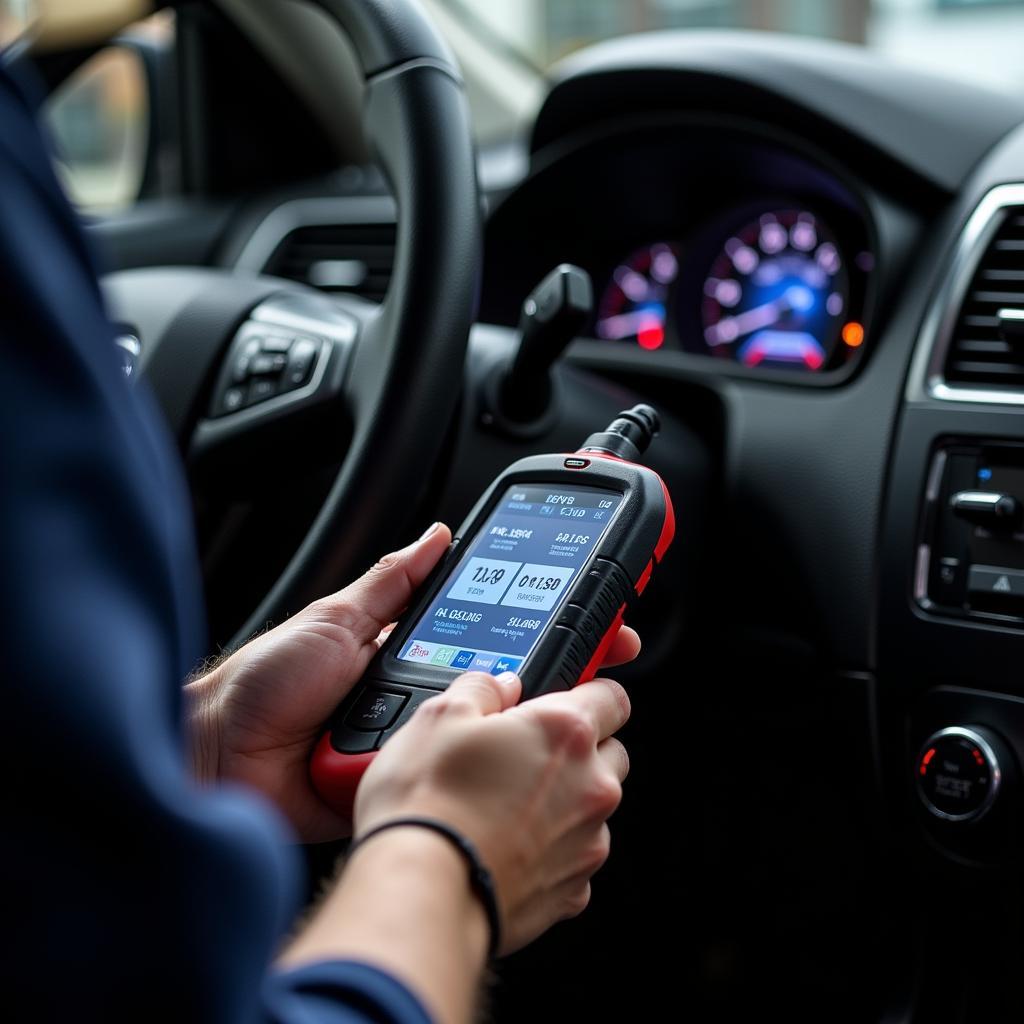Modern vehicles are complex machines, relying on a network of sensors, computers, and actuators to operate efficiently and safely. When a problem arises, understanding the issue often requires specialized equipment and knowledge – enter car diagnostics. Diagnostics On A Car involve retrieving data from your vehicle’s onboard computer system, providing valuable insights into the root cause of any malfunctions.
Why Are Car Diagnostics Important?
Gone are the days of relying solely on a mechanic’s intuition and basic tools to troubleshoot car problems. Today, diagnostics on a car play a crucial role in accurate and efficient repairs. Here’s why:
- Pinpoint Accuracy: Diagnostic tools communicate directly with your car’s computer, reading fault codes and live data streams that pinpoint the exact source of the problem.
- Time Efficiency: Diagnostics eliminate the guesswork, saving valuable time and effort in the repair process. Mechanics can focus on the actual issue, leading to quicker repairs.
- Cost Savings: By identifying the precise problem area, diagnostics prevent unnecessary part replacements, saving you money in the long run.
- Preventative Maintenance: Regular diagnostics on a car can detect minor issues before they escalate into major, costly repairs, helping you stay ahead of potential problems.
- Improved Safety: Addressing underlying issues detected through car diagnostics ensures your vehicle operates safely and reliably.
 Car Diagnostic Tools
Car Diagnostic Tools
What to Expect During Car Diagnostics
When you take your vehicle for diagnostics on a car, a qualified mechanic will typically follow these steps:
- Connect the Diagnostic Tool: A specialized tool is connected to your vehicle’s OBD-II (On-Board Diagnostics) port, typically located under the dashboard on the driver’s side.
- Retrieve Fault Codes: The diagnostic tool retrieves stored fault codes from the car’s computer, each code corresponding to a specific problem area.
- Analyze Live Data: The mechanic analyzes real-time data streams from various sensors, monitoring parameters like engine RPM, coolant temperature, and oxygen sensor readings.
- Interpret Results: Combining fault codes with live data analysis allows the mechanic to pinpoint the root cause of the issue.
- Diagnose and Recommend Repairs: Based on the diagnostic findings, the mechanic will explain the problem, recommend necessary repairs, and provide you with a cost estimate.
Common Issues Detected Through Car Diagnostics
Diagnostics on a car can detect a wide range of problems, including:
- Engine Problems: Misfires, low compression, sensor malfunctions (oxygen sensor, MAF sensor, etc.)
- Transmission Issues: Shifting problems, slipping gears, solenoid malfunctions
- Brake System Faults: ABS issues, brake fluid pressure problems, faulty sensors
- Electrical System Errors: Battery problems, alternator issues, wiring faults
- Emissions Control System Malfunctions: Faulty catalytic converter, oxygen sensor issues, EVAP system leaks
DIY vs. Professional Car Diagnostics
While DIY car diagnostic tools are available, it’s essential to understand their limitations. These tools can provide basic fault code readings, but interpreting the codes and analyzing live data often require specialized knowledge and experience. Professional mechanics have access to more advanced diagnostic equipment, software, and databases, enabling them to interpret complex data and diagnose problems accurately.
Choosing the Right Mechanic for Car Diagnostics
When seeking professional diagnostics on a car, choose a reputable mechanic or repair shop with:
- ASE-Certified Technicians: Look for technicians certified by the National Institute for Automotive Service Excellence (ASE), indicating their expertise.
- Specialized Diagnostic Equipment: Ensure the shop uses up-to-date diagnostic tools and software capable of communicating with your vehicle’s make and model.
- Positive Customer Reviews: Online reviews and testimonials can provide insights into the shop’s reputation and customer satisfaction.
- Transparent Communication: Choose a mechanic who clearly explains the diagnostic process, findings, and repair recommendations.
Car Diagnostics: An Essential Aspect of Modern Vehicle Maintenance
Diagnostics on a car have revolutionized the way vehicles are diagnosed and repaired, ensuring greater accuracy, efficiency, and cost-effectiveness. Whether you’re experiencing car troubles or want to stay ahead of potential problems, understanding the importance of car diagnostics empowers you to make informed decisions about your vehicle’s maintenance and repair needs.
FAQs
Q: How often should I get diagnostics on my car?
A: It’s generally recommended to have your car diagnosed annually or every 12,000 miles, as part of routine maintenance.
Q: Can I drive my car with the check engine light on?
A: It depends on the severity of the issue. Some problems may allow for continued driving, while others require immediate attention. It’s best to have the check engine light diagnosed promptly to avoid potential damage.
Q: Are car diagnostic tests expensive?
A: Diagnostic costs vary depending on the complexity of the issue and labor rates. However, the cost of diagnostics is often offset by the savings from accurate repairs and prevented future problems.
Q: Can car diagnostics detect problems with my car’s tires?
A: While car diagnostics focus on the vehicle’s internal systems, some tire pressure monitoring systems (TPMS) are integrated with the car’s computer and can be diagnosed for malfunctions.
Q: Can I clear my car’s fault codes myself?
A: While you can clear codes using a diagnostic tool, it’s not recommended unless you fully understand the underlying problem. Clearing codes without addressing the root cause can mask potential issues and lead to more significant problems down the line.
For expert car diagnostics and reliable repairs, consider A1 Car Diagnostics or explore mobile diagnostic options like mobile car diagnostics bradford.
Need help with your car diagnostics?
We’re here to assist! Contact us via WhatsApp: +1(641)206-8880 or Email: [email protected]. Our dedicated customer support team is available 24/7 to answer your questions and schedule an appointment.

Leave a Reply